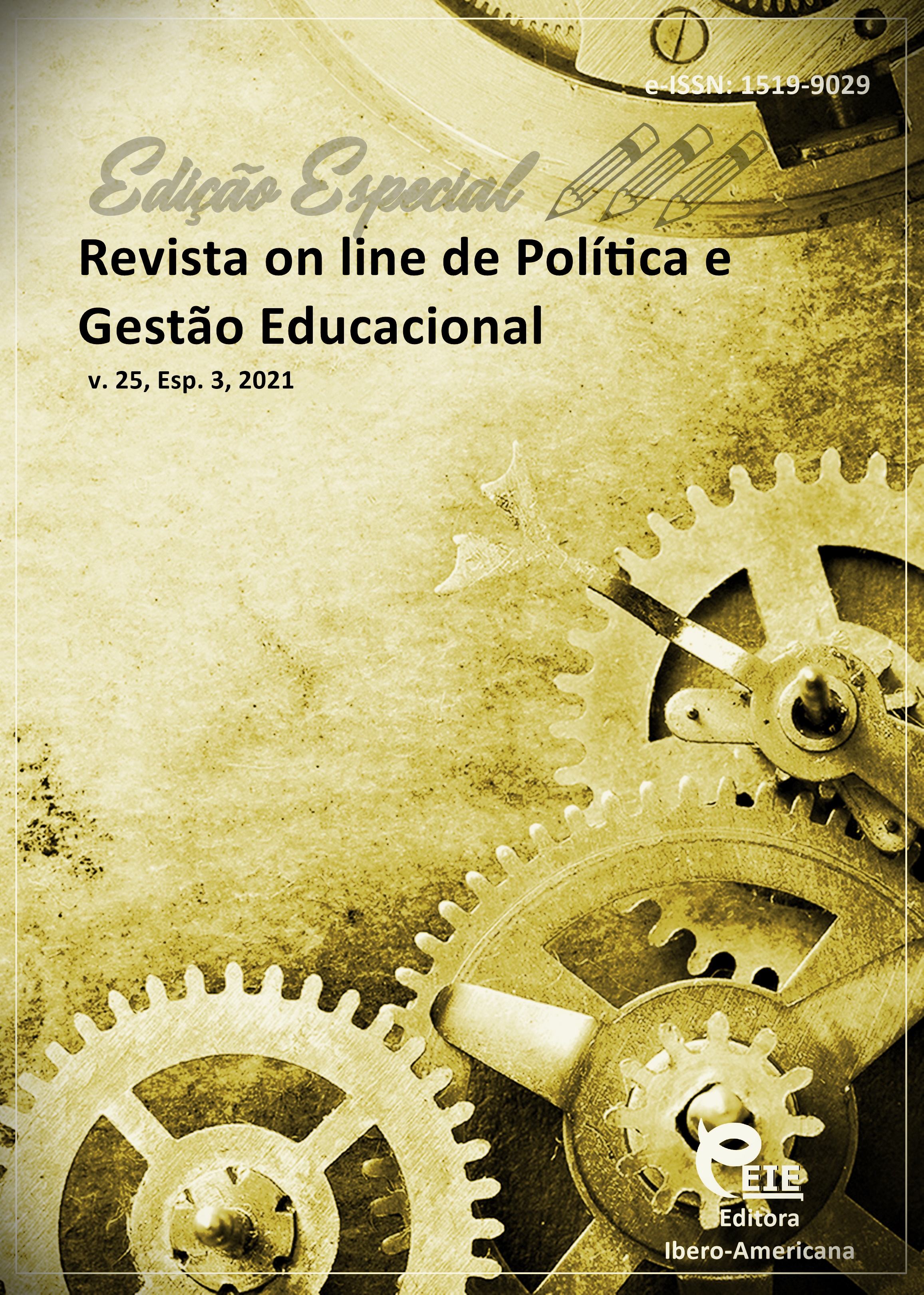Tecnologías innovadoras en la educación superior moderna: experiencia Europea y contexto Ucraniano
DOI:
https://doi.org/10.22633/rpge.v25iesp.3.15586Palabras clave:
Proceso educativo, Instituciones de educación superior, Innovación, Apoyo pedagógico, ModernizaciónResumen
Este estudio examina los problemas de la implementación de soluciones tecnológicas innovadoras en la educación superior moderna, considerando la experiencia europea acumulada y en el contexto ucraniano moderno. La relevancia de este estudio está condicionada por la amplia difusión de soluciones tecnológicas innovadoras en el sistema de educación superior europeo en general y Ucrania en particular, así como la necesidad de un estudio profundo y completo de este proceso considerando las perspectivas de desarrollo tecnológico de educación superior moderna y experiencia europea acumulada en este campo. El propósito de este estudio es determinar los factores fundamentales que influyen en el desarrollo de las innovaciones tecnológicas en el sistema de educación superior moderno.. Los principales resultados de este estudio deben ser la definición de la esencia de las tecnologías innovadoras en el sistema moderno de educación superior, los tipos y categorías de innovaciones modernas, así como las principales tendencias en la investigación académica en este campo.
Descargas
Citas
BENSON, R., BRACK, C. Online learning and assessment in higher education. Colchester: Chandos Publishing, 2010.
BORTSOV, YU.S.; STARYGINA, A.M. The strategy of innovative development of higher education in Russian Federation: opportunities and constraints, 2015. Available in: https://cyberleninka.ru/article/n/strategiya-innovatsionnogo-razvitiya-vysshego-obrazovaniya-v-rossii-vozmozhnosti-i-ogranicheniya.
CHEN, B.; CHANG, Y.-H.; OUYANG, F.; ZHOU, W. Fostering student engagement in online discussion through social learning analytics. The Internet and Higher Education, n. 37, pp. 21-30, 2018.
CROOK, C.; SCHOFIELD, L. The video lecture. The Internet and Higher Education, n. 34, pp. 56-64, 2017.
GLAVAS, C.; SCHUSTER, L. Design principles for electronic work integrated learning (eWIL). The Internet and Higher Education, n. 47, Article number: 100760, 2020.
MAVRI, A.; LOANNOU, A.; LOIZIDES, F. Cross-organisational Communities of Practice: enhancing creativity and epistemic cognition in higher education. The Internet and Higher Education, n. 49, Article number: 100792, 2021.
MILLER, I. Distance learning – a personal history. The Internet and Higher Education, v. 3, n. 1-2, pp. 7-21, 2000.
OOSTHOEK, H. Higher education and new technologies. Oxford: Pergamon Press, 2013.
RAMBE, P.; MLAMBO, S. Using digital storytelling to externalise personal knowledge of research processes: The case of a Knowledge Audio repository. The Internet and Higher Education, n. 22, pp. 11-23, 2014.
ROVAI, A. The Internet and higher education. Colchester: Chandos Publishing, 2009.
SADKOVOY, V.P. Mechanisms of state reforming of higher professional education in Ukraine. Actual Problems of the Humanities and Natural Sciences, v. 7, n. 2, pp. 183-187, 2014.
SONG, Y.; KONG, S.C. RETRACTED: Affordances and constraints of BYOD (Bring Your Own Device) for learning and teaching in higher education: Teachers' perspectives. The Internet and Higher Education, n. 32, pp. 39-46, 2017.
SULIMA, YE.N. Innovative processes in Ukrainian higher pedagogical education. Domestic and Foreign Pedagogy, n. 2(48), pp. 82-91, 2018.
VERNYAKHOVSKAYA, V.N. Promising forms of technology transfer in higher education. Science and Innovation, n. 6(112), pp. 47-50, 2012.
VERNYAKHOVSKAYA, V.N. Higher education as a key component of the national innovation system. Science and Innovation, n. 5(195), pp. 45-49, 2019.
VIGENTINI, L.; LIU, D.Y.T.; ARTHARS, N.; DOLLINGER, M. Evaluating the scaling of a LA tool through the lens of the SHEILA framework: A comparison of two cases from tinkerers to institutional adoption. The Internet and Higher Education, n. 45, Article number: 100728, 2020.
WARTMAN, S. The transformation of academic health centers. London: Academic Press, 2015.
WATTED, A.; BARAK, M. Motivating factors of MOOC completers: Comparing between university-affiliated students and general participants. The Internet and Higher Education, n. 37, pp. 11-20, 2018.
XIE, K.; DI TOSTO, G.; LU, L.; CHO, Y.S. Detecting leadership in peer-moderated online collaborative learning through text mining and social network analysis. The Internet and Higher Education, n. 38, pp. 9-17, 2018.
Publicado
Cómo citar
Número
Sección
Licencia
Derechos de autor 2021 Revista on line de Política e Gestão Educacional

Esta obra está bajo una licencia internacional Creative Commons Atribución-NoComercial-CompartirIgual 4.0.
Manuscritos aceitos e publicados são de propriedade da Revista on line de Política e Gestão Educacional. É vedada a submissão integral ou parcial do manuscrito a qualquer outro periódico. A responsabilidade do conteúdo dos artigos é exclusiva dos autores. É vedada a tradução para outro idioma sem a autorização escrita do Editor ouvida a Comissão Editorial Científica.










